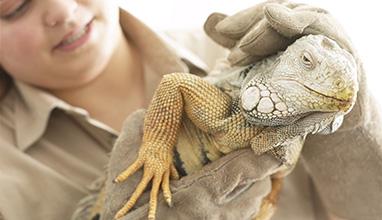The educational requirements for a career as a zoologist vary greatly depending upon the position sought. Individuals may obtain a bachelor’s degree to secure an entry-level position. Candidates who wish to become researchers, teachers or further develop their education and skills must attend graduate school and sometimes even obtain a doctoral degree.
High School
Individuals in high school who would like to become zoologists should strive for exemplary grades in order to gain admission into the best college possible. Coursework for a zoologist education should include lots of math and science courses, especially zoology, biology and anatomy when offered. Computer science courses are good to take, as well as communications electives. High school students can also gain experience by volunteering at animal shelters, participating in their local 4H groups, or serving as an intern at their local zoo. This also helps build the student’s resume and reference pool. Some zoos also offer paid jobs and shadowing opportunities for youths interested in this career.
Bachelor’s Degree
Most zoologist positions call for a minimum of a bachelor’s degree. During this degree, students will experience coursework in molecular and organism biology, chemistry, physics, animal behavior and genetics. Ecology, aquarium science and marine biology may also be included, depending upon concentrations selected by the student. Students should expect to spend around four years on their bachelor’s degree. The cost of a bachelor’s program averages $6,585 per academic year. Upon graduating, zoologists will be eligible for entry level positions in this field. Candidates can increase their likelihood of success by taking on an internship or job during their studies.
Master’s Degree
To further an individual’s education as a zoologist, the master’s degree is an option. Those who seek higher education can use their credentials to apply for state and federal government positions, research jobs and other careers that require a master’s degree as a credential. During the master’s program, zoologists have the opportunity to select an area to specialize in. Students also typically complete seminar programs as well as serve as teaching aids during their master’s training. Some of these areas include chemical ecology, molecular evolution, paleobiology and cytogenetics. Candidates can expect to spend up to six more years on a master’s degree, which costs about $14,825 per academic year.
Doctorate Degree
Zoologists who wish to advance in a career such as teaching or research studies typically require a doctorate degree. Most candidates must have a master’s degree in order to be admitted into a doctoral program, but some colleges take experience and other factors into consideration as well. During doctoral studies, students will be expected to perform well on an oral exam or other demonstration of competence. Lengthy, in-depth research projects are also a part of PhD programs. Many colleges host public final examinations during which candidates must present their research. Doctoral degrees vary in length depending upon each individual and cost an average of $20,904 annually.
A wide variety of opportunities await graduates of zoology programs. These graduates are by no means limited to zoological work. Conservationists, public health workers, biochemists and fishery biologists are all careers that accept zoology degrees as qualifications.






